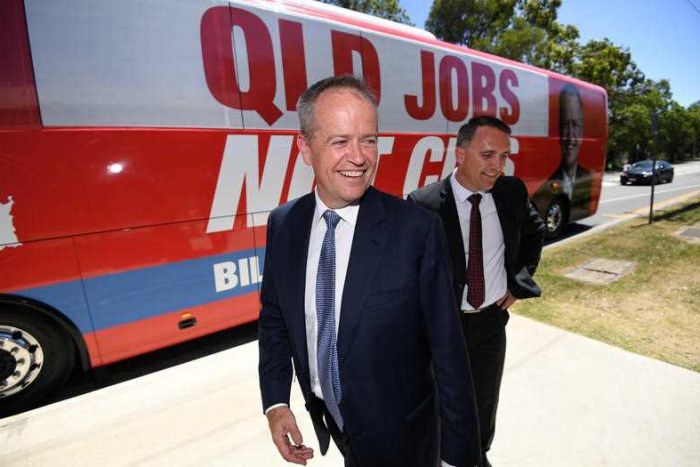It wasn't Bob Brown who lost the election, it was the Labor Party
Updated
 Photo:
Bob Brown and the hundreds of others who took part in the Adani convoy weren't trying to win office. (ABC News: Scott Ross)
Photo:
Bob Brown and the hundreds of others who took part in the Adani convoy weren't trying to win office. (ABC News: Scott Ross)
Many commentators have pointed the finger of blame at The Greens for the Coalition's election win.
Or more specifically, at former Greens leader Bob Brown's Adani convoy that travelled up Australia's east coast all the way into north Queensland's regional mining communities.
Even on election night, former Liberal senator Arthur Sinodinos didn't miss a beat, stating: "The Bob Brown caravan which went up there to talk about stopping Adani, had the effect of making a lot of locals say — hang on, you're not going to tell us how to live."
While Mr Brown might make a convenient scapegoat, the analysis is at best simplistic or at worst anti-democratic. It wasn't Mr Brown who lost the election, it was the ALP.
 Photo:
There are many reasons Labor lost the election and to blame Bob Brown's Adani convoy is nonsense. (AAP: Rohan Thomson)
Photo:
There are many reasons Labor lost the election and to blame Bob Brown's Adani convoy is nonsense. (AAP: Rohan Thomson)
The Greens' swing beat One Nation
Neither Mr Brown nor the hundreds of others who took part in the Adani convoy were doing so as part of a political campaign to win office.
They were simply exercising their democratic right as citizens to express their opinion about one of the biggest issues of our time — the existential threat posed by the climate emergency and the need to rapidly transition away from coal.
Arguably, by having the gall to front up in those communities, the Adani convoy should be applauded for opening up a dialogue rather than simply pontificating from inner cities, as environmental campaigners are often accused of doing.
Moreover, the hypothesis that Queenslanders voted against climate action simply isn't borne out in the facts of the election results.
In fact, The Greens received the biggest swing towards them of any party in this election, an increased national vote of 2.6 per cent, meaning they won nine Senate seats and will hold a dominant position in the Senate cross bench.
That swing was also consistent with the party's result in Queensland, where The Greens outpolled One Nation.
Even in regional parts of Queensland like Toowoomba (the seat of Groom), The Greens got a 2 per cent swing towards them, an increase of nearly a third from the last election.
Labor's position didn't please anyone
Clearly many Queensland voters are also worried about climate change and found a natural home with The Greens for the first time this election.
Apart from the damage done from Clive Palmer's cashed-up smear campaign, perhaps the real problem for Labor was that they were unable to take a position on Adani that pleased anyone.
Instead they hedged their bets — with Bill Shorten modifying his message depending on his audience, leaving neither pro-mining nor anti-Adani voters convinced of his sincerity. And who could blame them?
Certainly if Labor had ignored the pressure from the CFMMEU in Queensland and taken a stronger position on Adani they may have picked up some of the votes that bled to The Greens.
 Photo:
Bill Shorten and Labor were unable to find a position on Adani that pleased anyone. (AAP: Dan Peled )
Photo:
Bill Shorten and Labor were unable to find a position on Adani that pleased anyone. (AAP: Dan Peled )
The fact was that Mr Shorten's campaigning on climate change was far from convincing while he was unprepared to take a strong position on what the public perceives as the biggest environmental threat the country currently faces — opening up one of the world's largest remaining coal reserves in the Galilee basin to coal mining at a time of runaway climate change.
As Mr Brown has himself pointed out since the election, Scott Morrison deftly avoided even mentioning Adani throughout his election campaign. So in no sense does he have a mandate to open up the Galilee Basin to mining, despite Resources Minister Matt Canavan tweeting "Go Adani" after the election result became clear.
Democracy demands freedom of speech
We can be certain that there will be more Adani convoys, bigger high school student climate marches and more pressure than ever on the Morrison led Coalition government to take action on climate change.
And without a doubt, one of the takeaways from this election for the environment movement is the need to work harder to engage outside political bubbles.
And perhaps the Adani convoy could have done better groundwork before marching into traditional mining towns in Queensland.
But if the upshot of the argument that Mr Brown was somehow responsible for Labor's poor showing in the election is that we should resist taking to the streets in a democracy to put forward opinions about the most urgent issues of our time out of political pragmatism or so as not to offend certain voters — that would be a pretty sad indictment on the state of our democracy.
Of course there are many reasons why Labor lost the election, but to blame Mr Brown is a simply a convenient nonsense.
James Norman is a Melbourne writer and author of the book Bob Brown: Gentle Revolutionary, published by Allen & Unwin.
Topics: bill-shorten, brown-bob, greens, australia, qld
First posted









